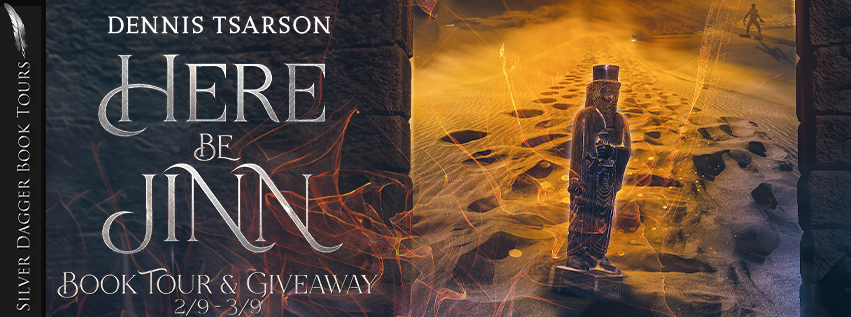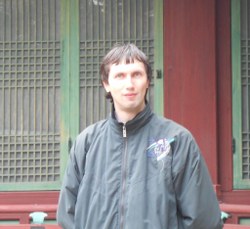Ancient magic is an advantage in the battle for the modern Middle East
Here Be Jinn
Fieldwork in Mesopotamia Book 1
by Dennis Tsarson
Genre: Contemporary Mythic Fantasy Action Adventure
Ancient and unknown forces have been unleashed in war-ravaged Iraq.
When Elliott Gildart decides to join an archeological dig in the drylands of northern Iraq, he expects a break from his monotonous job. But the discovery of an unusual and out-of-place megalithic platform turns exploration into a risky undertaking and leaves Elliott facing a future he’s not sure he’s prepared for.
Meanwhile, Neil Feaver and his cameraman, Jake Parvis, stumble upon their own strange developments while filming a documentary about Iraq’s ongoing civil war. Saved from imminent danger by a mysterious stranger, they soon learn that lost magic and mystical artifacts have fallen into the wrong hands. Now, everyone finds themselves caught in the crisis, involving coalition forces, Islamist militants, and enigmatic factions that have existed since the times of the Ancient Near East.
As terrifying forces align, can they prevent impending peril? Or will ancient magic be enough to turn the tides?
Amazon * Apple * B&N * Kobo * Bookbub * Goodreads
At first glance, the drylands could have been mistaken for a desert. An arid and mostly lifeless landscape, they appeared to spread on and on with no end in sight. Yet when Elliott jumped out of the land cruiser, the crumbling feeling beneath his feet indicated that it was not sand but parched soil that he stood upon. He looked around the area. The terrain was uneven; many mounds of different sizes dotted the landscape, rising from the earth like boils on burnt skin.
And, of course, there was the heat. It might have been only February, but for somebody who hailed from lands of a significantly colder climate, it was unbearable. Elliott swore that had it not been for the baseball cap covering his blond head, the wall of heat would have brought him down on the ground unconscious. The door of one of the off-road vehicles opened. Mergham was the first to step out, followed by Lauren, who jumped out with her usual grace. They were then joined outside by another colleague: Mr Akhmad. A local of Iraqi Kurdistan who had met up with them in Erbil. He was some years younger than Mergham and noticeably bigger in muscle mass. He had been described as a local guide and logistics co-ordinator by Mergham, and this made him the third part of the triumvirate in charge of the dig alongside Lauren and the author himself.
Elliott was not a geography expert—he wasn’t sure if these drylands even had an official name. Yet here he was, at the end of the known world, countless miles away from the perpetual dullness of urban life and the wretched call centre. Still, though their small fleet of four-wheel-drives had brought them to the middle of nowhere, they were not just left there in the wilderness. A small camp had already been set up. He could see the pointed shapes of two dozen tents about a hundred metres away. As he had been informed, a couple of people affiliated with the dig had arrived at the site some days beforehand.
“Ladies and gentlemen!” Dr Mergham spoke after summoning all the arrivals in a ring around him. “We’ve made it! This will be our camp for the next couple of months.”
“Woo-hoo!” shouted one of the team members. This comical cry of joy was followed by a brief round of chuckling from a few others.
“Yes, I am sure you are all excited,” Mergham continued, smiling himself, “but first please give a round of applause for the man without whom you would not be seeing this camp here.” He gestured towards the man standing to his left. “Mr Akhmad!”
People clapped, and they clapped sincerely.
“Thank you,” Akhmad said, his voice laced with a strong accent, lightly bowing his head. “Thank you.”
“Perhaps you could give the team an orientation tour of this camp?” Mergham suggested.
“Of course.”
The camp was not big, but neither was the group: there were just over twenty of them. The main operations tent, a fabric pavilion, was located in the centre of the encampment; it stood out amongst its neighbours in length, width, and height. Next to it was a gazebo used for the storage of equipment. Nearby was the one for supplies, and another chosen to store finds. One was set up as a kitchen. Other than that, the campsite did not have a special plan or layout; the individual tents were pitched at random. Shower tents as well as toilet tents could be found a short distance away from the main cluster. The team were introduced to the people who were already on-site: three assistant archaeologists and the cook.
Their guided walk ended back at their vehicles’ location. Then their first assignment began; they had to unload the supplies they’d brought with them and bring them to the storage gazebo. Naturally, three people were exempt from it—it was not hard to guess who. And once this task was done, with everything out of the vehicles and sorted, they received payment…in the form of another excursion, now led by Mergham himself.
The sun was still shining far above them when they set out towards the archaeological site. Clutching a map in his hand, Leonard led them deeper into their new and unusual surroundings, this unexplored wilderness. They walked for about ten or so minutes, through flat land and mounds, until the site appeared before them.
“Here it is!” the author declared, extending his hand as he gripped the map even harder. “This is the place we’ll be excavating.”
A self-described amateur scholar, Dennis Tsarson has been interested in the world’s mythology and folklore traditions since reading Greek myths as a boy. That interest grew into an undergraduate degree in history and archeological training, which he incorporates into his fantasy retellings while travelling the globe. When he’s not writing or exploring new countries and their cultural histories, you can find him settled in the United Kingdom, studying the comparative tendencies in folktales around the world.









No comments:
Post a Comment